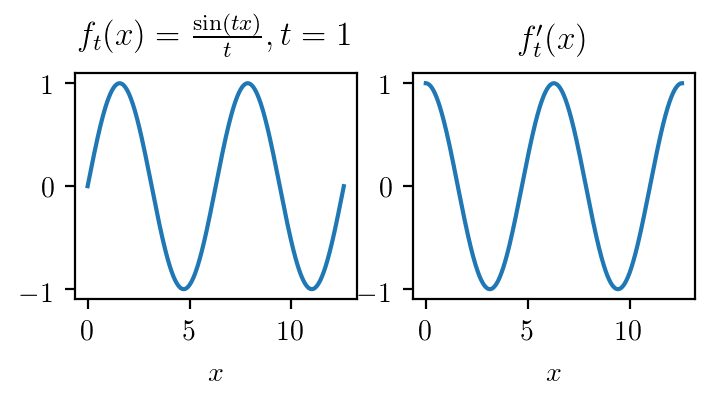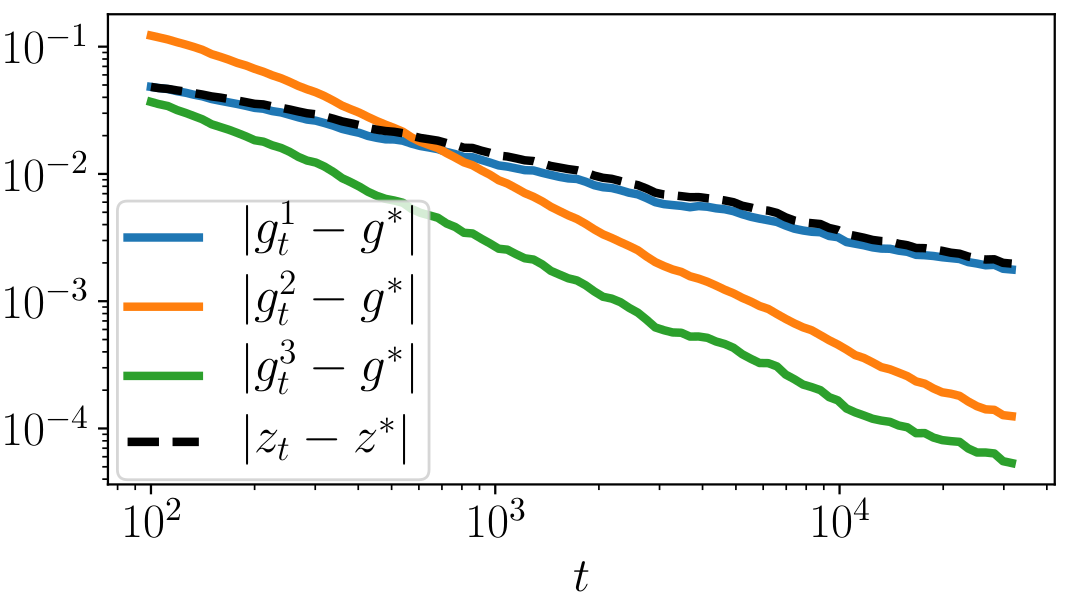Super-efficiency of automatic differentiation for functions defined as a minimum
https://arxiv.org/abs/2002.03722
Pierre Ablin
Joint work with Gabriel Peyré and Thomas Moreau
ICML 2020
10/05/2021
Optimization topic group

Introduction to automatic differentiation
[Baydin et al., 2015, Automatic differentiation in machine learning: a survey]
Automatic differentiation ?
- Method to compute the differential of a function using a computer
Input
def f(x):
return x ** 2
f(1.)
>>>> 1.Output
g = grad(f)
g(1.)
>>>> 2.0Automatic differentiation ?
- Method to compute the differential of a function using a computer
Input
def f(x):
return np.log(1 + x ** 2) / x
f(1.)
>>>> 0.6931471805599453Output
g = grad(f)
g(1.)
>>>> 0.3068528194400547Prototypical case
\(f\) defined recursively:
- \(f_0(x) = x\)
- \(f_{k+1}(x) = 4 f_{k}(x) (1 - f_k(x))\)
Input
def f(x, n=4):
v = x
for i in range(n):
v = 4 * v * (1 - v)
return v
f(0.25)
>>>> 0.75Output
g = grad(f)
g(0.25)
>>>> -16.0Automatic differentiation is not...
Numerical differentiation
$$f'(x) \simeq \frac{f(x + h) - f(x)}{h}$$
In higher dimension:
$$ \frac{\partial f} {\partial x_i} (\mathbf{x}) \simeq \frac{f(\mathbf{x} + h \mathbf{e}_i) - f(\mathbf{x})}{h}$$
Drawbacks:
- Computing \(\nabla f = [\frac{\partial f}{\partial x_1}, \cdots, \frac{\partial f}{\partial x_n}]\) takes \(n\) computations
- Inexact method
- How to choose \(h\)?
Automatic differentiation is not...
Numerical differentiation
Example:
from scipy.optimize import approx_fprime
approx_fprime(0.25, f, 1e-7)
>>>> -16.00001599
Automatic differentiation is not...
Symbolic differentiation
- Takes as input a function specified as symbolic operations
- Apply the usual rules of differentiation to give the derivative as symbolic operations
Example:
\(f_4(x) = 64x(1−x)(1−2x)^2 (1−8x+ 8x^2 )^2\), so:
Then, evaluate \(f'(x)\)
Automatic differentiation is not...
Symbolic differentiation
- Exact
- Expression swell: derivatives can have many more terms than the base function
\(f_n\) \(f'_n\) \(f'_n\) (simplified)

Automatic differentiation:
Apply symbolic differentiation at the elementary operation level and keep intermediate numerical results, in lockstep with the evaluation of the main function.
- Function = graph of elementary operations
- Follow the graph and differentiate each operation using differentiation rules (linearity, chain rule, ...)
def f(x, n=4):
v = x
for i in range(n):
v = 4 * v * (1 - v)
return v
f(0.25)
>>>> 0.75def g(x, n=4):
v, dv = x, 1.
for i in range(n):
v, dv = 4 * v * (1 - v), 4 * dv * (1 - v) - 4 * v * dv
return dv
g(0.25)
>>>> -16.0Forward automatic differentiation:
Apply symbolic differentiation at the elementary operation level and keep intermediate numerical results, in lockstep with the evaluation of the main function.
- Function = graph of elementary operations
- Follow the graph and differentiate each operation using differentiation rules (linearity, chain rule, ...)
- If \(f:\mathbb{R}\to \mathbb{R}^m\): need one pass to compute all derivatives :)
- If \(f:\mathbb{R}^n \to \mathbb{R}\): need \(n\) passes to compute all derivatives :(
- Bad for ML
Reverse automatic differentiation: Backprop
- Function = graph of elementary operations
- Compute the graph and its elements
- Go through the graph backwards to compute the derivatives
def f(x, n=4):
v = x
for i in range(n):
v = 4 * v * (1 - v)
return v
f(0.25)
>>>> 0.75def g(x, n=4):
v = x
memory = []
for i in range(n):
memory.append(v)
v = 4 * v * (1 - v)
dv = 1
for v in memory[::-1]:
dv = 4 * dv * (1 - v) - 4 * dv * v
return dv
g(0.25)
>>>> -16.0Reverse automatic differentiation: Backprop
- Function = graph of elementary operations
- Compute the graph and its elements
- Go through the graph backwards to compute the derivatives
-Only one passe to compute gradients of functions \(\mathbb{R}^n \to \mathbb{R}\) :)
Example on a 2d function
$$f(x, y) = yx^2, \enspace x = y= 1$$
Function
\(x =1\)
\(y = 1\)
\(v_1 = x^2 = 1\)
\(v_2 =yv_1 = 1\)
\(f = v_2 =1\)
Forward AD (w.r.t. \(x\))
Backprop \( \)
\(\frac{dx}{dx} =1\)
\(\frac{dy}{dx} = 0\)
\(\frac{dv_1}{dx} =2x \frac{dx}{dx} = 2\)
\(\frac{dv_2}{dx} =y\frac{dv_1}{dx} +v_1 \frac{dy}{dx} =2\)
\(\frac{df}{dx} = \frac{dv_2}{dx}=2\)
\(\frac{df}{dv_2}= 1\)
\(\frac{df}{dy} = \frac{df}{dv_2 }\frac{dv_2}{dy} = \frac{df}{dv_2 }v_1 = 1\)
\(\frac{df}{dv_1} =y\frac{df}{ dv_2} = 1\)
\(\frac{df}{dx} = 2 x \frac{df}{dv_1} = 2\)
Automatic differentiation:
- Exact
- Takes about the same time to compute the gradient and the function
- Requires memory: need to store intermediate variables
- Easy to use
- Available in Pytorch, Tensorflow, jax, package autograd with numpy
from autograd import grad
g = grad(f)
g(0.25)
>>>> -16.0
Questions ?
Automatic differentiation for optimization
Example 1: Learning to learn
Ridge regression: minimize \(\ell(\beta) = \frac12 \| X \beta - y\|^2 + \frac\lambda 2\|\beta\|^2\)
Gradient descent with step \(\rho > 0\) for \(T\) iterations:
- \(\beta_0 = 0\)
- \(\beta_{t+1} = \beta_t - \rho( X^{\top}(X\beta -y) + \lambda \beta)\)
We see it as a function \(GD:\rho \to \beta_T\).
What is the best \(\rho\) ?
[Gregor, Lecun, 2010, Learning Fast Approximations of Sparse Coding]
Example 1: Learning to learn
Ridge regression: minimize \(\ell(\beta) = \frac12 \| X \beta - y\|^2 + \frac\lambda 2\|\beta\|^2\)
We want to find \(\rho\) that minimizes \(\ell(GD(\rho))\)
\(\to\) use gradient descent!
$$ \rho \leftarrow \rho - 0.01 \nabla_{\rho}\ell(GD(\rho))$$
\(\nabla_{\rho}\ell(GD(\rho))\) is computed using automatic differentiation

Example 2: hyperparameter optimization
Ridge regression: minimize \(\ell(\beta, \lambda) = \frac12 \| X \beta - y\|^2 + \frac\lambda 2\|\beta\|^2\)
- Assume we have a test set \(X_{test}, y_{test}\). Minimize test error:
$$\ell'(\beta) = \frac12\|X_{test}\beta - y_{test}\|^2$$
subject to :
$$ \beta = \arg\min \ell(\beta, \lambda)$$
- In this simple case, closed-form solution for \(\beta\), but not in general
[Bengio, 1990, Gradient based optimization of hyperparameters]
Example 2: hyperparameter optimization
Ridge regression: minimize \(\ell(\beta, \lambda) = \frac12 \| X \beta - y\|^2 + \frac\lambda 2\|\beta\|^2\)
$$ \min \ell'(\beta) = \frac12\|X_{test}\beta - y_{test}\|^2 \enspace \text{s.t.} \enspace \beta = \arg\min \ell(\beta, \lambda)$$
- Define the output of gradient descent \(GD: \lambda \to \beta\):
$$GD(\lambda) \simeq \argmin_{\beta} \ell(\beta, \lambda)$$
- Optimize \(\ell'(GD(\lambda))\) with gradient descent, using autodiff to compute the gradient
Better scaling with # of hyperparameters than grid-search
Questions ?
Super efficiency of autodiff for functions defined as a minimum
Setting:
- Minimization not in closed-form : sequence \(z_t(x)\) produced by e.g. gradient descent such that \(\mathcal{L}( z_t(x), x) \to \ell(x)\)
- How can we estimate \( \nabla \ell(x)\) using \(z_t(x)\)?
- Use \(\nabla \ell(x)\) e.g. to minimize / maximize \(\ell\)
The analytic estimator
- Assume \(\mathcal{L}\) is differentiable and there is \(z^*(x)\) such that \(\ell(x)=\mathcal{L}(z^*(x), x)\)
$$\nabla_x\ell(x) = J^*\underbrace{\nabla_z \mathcal{L}(z^*(x), x)}_{=0 } + \nabla_x \mathcal{L}(z^*(x), x)$$
\(J^*= \frac{\partial z^*}{\partial x}\) is the Jacobian of \(z^*\)
$$\nabla_x\ell(x) = \nabla_x \mathcal{L}(z^*(x), x)$$
The analytic estimator
- Given a sequence \(z_t(x)\) approaching \(z^*(x)\), the analytic estimator is:
$$\nabla_x\ell(x) = \nabla_x \mathcal{L}(z^*(x), x)$$
If \(\nabla_x \mathcal{L} \) is \(L-\)Lipschitz:
$$ |g^1_t (x) - \nabla_x \ell(x)| \leq L |z_t(x) - z^*(x)|$$
\(g^1\) converges at the same speed as \(z_t\)
The autodiff estimator
- Given a sequence \(z_t(x)\) approaching \(z^*(x)\), the autodiff estimator is:
Derivative with respect to \(z_t(x)\) as well:
$$g^2_t(x) = \nabla_x\mathcal{L}(z_t, x) + J_t\nabla_z\mathcal{L}(z_t, x)$$
\(J_t = \frac{\partial z_t}{\partial x}\) is the Jacobian of \(z_t\)
-\(g^2_t\) can be computed at ~ the same cost as \(z_t\)using autodiff
The autodiff estimator
Look at second order expansions:
$$\nabla_x\mathcal{L}(z_t, x) = \nabla_x \ell(x) + \nabla_{xz}\mathcal{L}(z^*, x)(z_t -z^*) + R_{xz}$$
$$\nabla_z\mathcal{L}(z_t, x) =\nabla_{zz}\mathcal{L}(z^*, x) (z_t - z^*) + R_{zz}$$
Rests are \(R_{xz}, R_{zz} = O(|z_t - z^*|^2)\).
Jacobian error:
$$R(J) = J \nabla_{zz}\mathcal{L}(z^*, x) + \nabla_{xz}\mathcal{L}(z^*, x)$$
$$g^2_t(x) = \nabla_x\mathcal{L}(z_t, x) + J_t\nabla_z\mathcal{L}(z_t, x)$$
The autodiff estimator
Implicit functions theorem:
$$R(J^*) = J^* \nabla_{zz}\mathcal{L}(z^*, x) + \nabla_{xz}\mathcal{L}(z^*, x) = 0$$
So if \(J_t \to J^*\) (more later), \(R(J_t) \to 0\) and:
\(g^2\) converges faster than \(z_t\)
The implicit estimator
Recall:
$$\nabla_x\ell(x) = J^*\nabla_z \mathcal{L}(z^*(x), x) + \nabla_x \mathcal{L}(z^*(x), x)$$
Implicit function theorem:
$$J^* = - \nabla_{xz}\mathcal{L}(z^*, x) \left[\nabla_{zz}\mathcal{L}(z^*, x)\right]^{-1} = \mathcal{J}(z^*, x)$$
Implicit estimator:
$$g^3_t = \mathcal{J}(z_t, x) \nabla_z \mathcal{L}(z_t, x) + \nabla_x \mathcal{L}(z_t, x)$$
The implicit estimator
$$g^3_t = \mathcal{J}(z_t, x) \nabla_z \mathcal{L}(z_t, x) + \nabla_x \mathcal{L}(z_t, x)$$
Just like \(g^2\), we have:
Hence if \(R(\mathcal{J}(z_t, x)) = O(|z_t - z^*|)\):
$$ g^3_t = \nabla_x \ell(x) + O(|z_t - z^*|^2)$$
\(g^3\) converges twice as fast as \(z_t\)
So far...
$$g^1 - \nabla_x \ell \simeq \enspace z_t - z^*\enspace$$
$$g^2 - \nabla_x \ell <\enspace z_t - z^*\enspace$$
$$g^3 - \nabla_x \ell \simeq (z_t - z^*)^2$$

Example on a logistic loss:
$$\mathcal{L}(z, x) = \sum_{i=1}^n \log(1 + \exp(- x_i [Dz]_i)) + \lambda \|z\|^2$$
\(z_t\) obtained with gradient descent:
Tighter analysis of the autodiff estimator
Recall:
$$g^2 - \nabla_x \ell = R(J_t) (z_t - z^*) + O(|z_t - z^*|^2)$$
We want to analyse \(R(J_t)\).
Assume \(z_t(x) \to z^*(x)\), do we have
$$J_t = \frac{\partial z_t(x)}{\partial x} \to J^* = \frac{\partial z^*(x)}{\partial x}?$$
In general, no :(
$$z_t(x) = \frac1t\sin(tx) \rightarrow 0$$
$$J_t = \cos(tx) \nrightarrow 0$$

Tighter analysis of the autodiff estimator
Assume \(\mathcal{L}\) is \(\mu\)-strongly convex and \(L\)-smooth w.r.t. \(z\), and that \(z_t\) is obtained by gradient descent:
$$z_{t+1}(x) = z_t(x) - \rho \nabla_z\mathcal{L}(z_t(x), x)$$
Then,
$$|z_t - z^*| = O(\kappa^t)$$
$$\|J_t - J^*\| = O(t \kappa^t), \enspace \kappa = 1 - \rho \mu$$
We obtain \(z^t\) using optimization methods \(\to\) no such problem.
Theorem:
\(J_t\) converges slightly slower than \(z_t\)
Bounds in the strongly convex setting
Assume \(\mathcal{L}\) is \(\mu\)-strongly convex and \(L\)-smooth w.r.t. \(z\), and that \(z_t\) is obtained by gradient descent:
$$z_{t+1}(x) = z_t(x) - \rho \nabla_z\mathcal{L}(z_t(x), x)$$
Then,
$$g^1 - \nabla_x\ell(x) = \enspace O(\kappa^{t})$$
$$g^2 - \nabla_x\ell(x) = O(t\kappa^{2t})$$
$$g^3 - \nabla_x\ell(x) = \enspace O(\kappa^{2t})$$

Beyond linear convergence
For SGD / a class of non-strongly convex functions (p-Lojasiewicz), we get:
$$g^1 - \nabla_x\ell(x) = O(z_t - z^*)\enspace \enspace$$
$$g^2 - \nabla_x\ell(x) = O((z_t-z^*)^2)$$
$$g^3 - \nabla_x\ell(x) = O((z_t-z^*)^2)$$
SGD example:

In practice:
In the linear convergence case:
$$g^1 - \nabla_x\ell(x) = \enspace O(\kappa^{t})$$
$$g^2 - \nabla_x\ell(x) = O(t\kappa^{2t})$$
$$g^3 - \nabla_x\ell(x) = \enspace O(\kappa^{2t})$$
But...
-Computing \(g^2\) is about twice as costly as \(g^1\) \(\to\) pointless to use \(g^2\)
$$g^2_{t} \simeq g^1_{2t}$$
-Computing \(g^3\) involves matrix inversion / big operators
In practice:
In the sub-linear convergence case:
$$g^1 - \nabla_x\ell(x) = O(1 / t)\enspace$$
$$g^2 -\nabla_x\ell(x) = O(1 / t^2)$$
$$g^3 - \nabla_x\ell(x) = O(1 / t^2)$$
-Much better to use \(g^2\) than \(g^1\)
Thanks for you attention !
autodiff
By Pierre Ablin
autodiff
- 841



